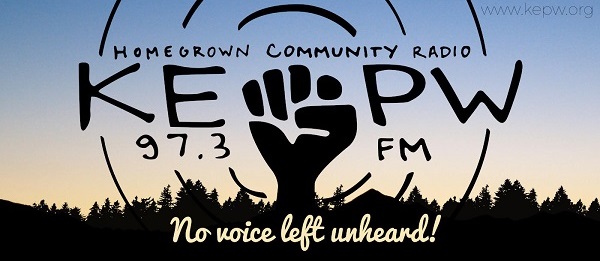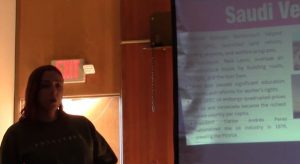Norman Solomon praises CALC, Eugene PeaceWorks activists
5 min read
DJ Suss D: Norman Solomon is an American journalist, media critic, author, and activist. His latest book, War Made Invisible: How America Hides the Human Toll of its Military Machine, will be published by The New Press in June, 2023.
[00:00:14] He spoke at an Encircle Films screening at the Metro Theater in Eugene, Oregon on Theaters of War: How the Pentagon and the CIA Took Hollywood, a movie about how the military and CIA have pushed official narratives while systematically scrubbing scripts of war crimes, corruption, racism, sexual assault, coups, assassinations, and torture.
[00:00:36] The Pentagon enables every state in the union with defense contractor jobs.
[00:00:41] Norman Solomon: The senators, including the two from Oregon, are overwhelmingly part of the military-industrial complex. There is no question about that. If you look at even the best, someone like—let me just give an example, (Sen. Jeff) Merkley.
[00:00:54] They’re still marching in step with a set of policies that are bringing us closer to nuclear war, confrontation with Russia and unwillingness to speak out against a president of his own party.
[00:01:11] DJ Suss D: He outlined the desperate measures needed in the time of mass media.
[00:01:15] Norman Solomon: And so if you look, for instance, at the radio terrain, you have several million people in this country, including probably hundreds of thousands in the state of Oregon, who are listening to NPR News every day.
[00:01:29] They’re listening to All Things Considered and Morning Edition, and they, through the process of water on the stone, come to believe that they’re getting an accurate, balanced, wide-ranging view of the world because they’re talked to in complete sentences. And the news report might last all of 10 minutes.
[00:01:49] When we’ve had wars such as the Gulf War in 91, the invasion of Iraq, the attacks on Afghanistan, the bombing of Libya, the NPR stands for National Pentagon Radio. That’s just a reality.
[00:02:03] So I urge people in this instance, stop giving your money to KLCC. I encourage people, yeah, read the New York Times, listen to All Things Considered and Morning Edition, but also listen to Democracy Now. Also, go to websites like Common Dreams or Truth Out, and then make your own decision.
[00:02:23] But we’re getting right now from the mass media is kind of a monoculture, monocrop. It’s extremely unhealthy. It is part of the military-industrial complex tacitly, in terms of how it actually reports. And it’s not just what they do report, it’s what they refuse to report. It’s the silences that are so powerful in terms of propaganda.
[00:02:46] Video, film production, writing books, articles, newspapers, independent radio stations, political organizing. We have the examples of CALC, Eugene PeaceWorks. There are groups and activists all over the country engaged in trying to create a nonviolent and emphatic culture of resistance, which is so needed.
[00:03:07] So I think that whatever people’s passions are, and talents and skills are, keep the shoulders to the wheel, encourage others to do that. And also we do need to be highly critical, not euphemistic, and direct about the media terrain. And if you look at a paper like The Oregonian, look at a paper like the New York Times?
[00:03:28] Sure, there are exceptional instances of articles that run counter to the militaristic strain, what Martin Luther King called the ‘madness of militarism.’ But the essence of propaganda is repetition. We need to raise hell, non-violently refusing to engage in any sort of violence whatsoever, but also refusing to defer to and enable people in power, whether it’s your member of the House, your two Senate members, and so forth.
[00:03:57] Martin Luther King referred to what he called the marvelous new militancy of nonviolence, and we’re not getting nearly enough of the marvelous non-violent militancy that we need. We’ve got to organize as though our lives depend on it—because they do.
[00:04:14] DJ Suss D: For KEPW Weekly News, I’m DJ Suss D.
[00:04:23] John Q: Norman Solomon mentioned two local organizations: CALC and Eugene PeaceWorks.
[00:04:29] Chico Schwall: Hi. I’m Chico Schwall…As many of you know, Eugene PeaceWorks is a grassroots organization working for peace and justice, and on media issues; began as a 501(c)(3) in 1981 with a focus on anti-nuclear issues. Our strengths include our collaboration with other community organizations; CALC and EPW are partial sponsors with Encircle Films of tonight’s presentation because we all thought it was a good idea.
[00:04:58] Seven years ago, unable to make much of a dent in the existing media, we decided to become the media and started a radio station, KEPW, which is a locally-controlled, membership-supported, low-wattage radio station right here in Eugene.
[00:05:18] There are two great ways you could learn more about not only Eugene Peace Works, but KEPW Radio.
[00:05:25] One is right up at the back of the room. He has an information table and you can pick up some stuff to read or you can ask him questions. He’s been heavily involved with KEPW since its very beginning.
[00:05:39] And the other way is you can go to KEPW.org, which you can do even if you’re out of the listening radius, you can be in Bangkok and just like bring it up on your computer and listen: Hit the ‘Listen Now’ button and listen to whatever’s on the air. Hit another button and get the entire schedule of what we do; profiles of the people who are working there; some of the community projects and youth projects that we’re working on now, which continue to change and evolve. It’s pretty exciting.
[00:06:08] Mariko Plescia: It’s Mariko Plescia and I work at Community Alliance of Lane County known to you, many of you maybe as CALC.
[00:06:18] Founded in 1966, CALC has been speaking truth to power ever since. Our mission is to educate and organize for human dignity, racial, social, and economic justice and peace.
[00:06:36] Thank you so much to Encircle Films for bringing this film to our community and for inviting us to co-sponsor the film as part of our Re-imagining National Security initiative, which dialogs with so many of the topics brought forth in this film.
[00:06:54] The film made me think about the veterans in our community who are unhoused, who are facing addiction, without the services they need; too many of our neighbors who have come crossing the border, the militarized border, or seeking asylum from countries where our military has made their country unlivable.
[00:07:16] I invite you to check out CALC’s webpage and check out our programs. Because one of the main things that the film really made me think about was, actually: Why is the Department of Defense and the CIA going to these lengths? Well, it’s because when the community doesn’t listen to the narrative that serves power, we have a lot of power.
[00:07:42] And so that’s what our programs are seeking to do, to bring out community discussion and educate and organize. So thanks so much, Encircle Films. (Applause)







